- Home
- Neal Shusterman
Game Changer Page 2
Game Changer Read online
Page 2
“She did the right thing,” Leo said after it happened. “Senior year shouldn’t be about waiting for someone you might never see again. And sometimes it’s best to pull the Band-Aid off fast.” Although it seemed to me it was more like a full chest waxing.
I sat down next to him on the bench. “You do know that all the girls in the stands are gonna have their eyes on you now, right?”
“I know it,” he said. “But I’m not there yet. A few more weeks.”
I had to hand it to him. Other guys might rebound into the next pair of open arms, but not Leo. He had his priorities straight.
“Well, then,” I said, “maybe you can deflect some of those eyes in my direction.”
“Will do,” he said, then his grin took on the slightest slant. “Problem is, it’ll only work for the ones who need glasses.”
I laughed, and he laughed harder, and I laughed harder still. That’s the way it was with us. The way I thought it would always be.
The first five minutes of the game were high energy, because we were so excited to be back on the field before cheering spectators. The Wildebeests were a competent but uninspired team. A good team to cut our teeth on in the beginning of the season. No score by the start of the second quarter, but we were confident of the win. Then Layton Vandenboom, our quarterback, made a bad pass that was intercepted. While he beat himself up over it (something he would continue to do for a whole week, whether we won or lost), the defensive squad took the field. That meant me, if you haven’t been paying attention.
The Wildebeests had a weasel of a quarterback, known for complaining to the refs about every little thing. Taking down the whining Wildebeest weasel would be a very satisfying thing.
So both teams got into position on the line of scrimmage, and the play began. The ball was snapped, and I sprang into action. You’re supposed to engage by the shoulders. Helmet crunches, while not strictly forbidden, are not advised, but sometimes can’t be avoided. Things happen. And, as I’ve always loved that head-banging feeling, I never minded when it happened. Like I said, my power hit was my trademark. It was the thing that could maybe get me the scholarships that my father never got.
But this time, the hit was different.
You know how sometimes when you’re startled by a loud sound, your brain misfires so you see a phantom flash along with the sound? Well, this was like a sudden surge of phantom cold. Not a blast of air or a feverish chill—it was more like my blood had been replaced by ice water, but only for an instant. Then the feeling was gone and I was on the ground, and I had tackled the Wildebeest weasel, ball still in hand, and the crowd was cheering.
I didn’t even remember the time between hitting the lineman and getting to the quarterback. It was like I teleported there.
Twelve-yard loss for the Wildebeests. The weasel was whining that there should have been a flag on the play, but of course there was none, because there was no infraction. Nothing unusual about the play . . . except for the cold that I could no longer feel, but that had been very real. What the hell was that?
High fives, butt slaps, knuckle punches, and back to the line. Only now I had something like a headache. Not really a headache, but something like one. It felt like an electric hum that you feel instead of hear. Walk it off, right? I did, and didn’t think about it for the rest of the game.
We won twenty-four to fourteen, and in our post-game high, the memory of that icebolt was almost lost. It wasn’t until much later that I remembered it.
After the game, a bunch of us went out for burgers at the Tibbetsville Towne Centre—one of those pretentious anti-malls with misplaced e’s that’s all about Fridaye and Saturdaye nights. Movie theaters, bowling, and restaurants, as well as a fast-food court for those who just wanted to scarf down something quick and cheap. As the best football team in a town that mainlined the sport, the Tsunamis basically owned the food court on Friday nights.
Layton had his girlfriend, Katie, with him. His arm hung around her shoulders like a slab of beef weighing her down. When you think of a quarterback and his popular girlfriend, these are the two you picture. Layton was an all-American, white-bread kid who probably dreamed of being Captain America. Katie was a cheerleader who had a lot more going for her that Layton didn’t notice. He had trouble seeing past her pom-poms.
You know how some people see a stereotype, and just become it? The path is there, it’s wide, and it’s well trod. It’s easier to follow that path than to defy it. Some people follow that path all the way into the box that’s waiting for them at the end, where the sermon is rote and the flowers are plastic. And so it is and ever shall be, the quarterback and the cheerleader, in every school, in every town, now and forever, amen.
I don’t think Katie was really a cheerleader by choice. In the spring she played tennis, and clearly her heart was in that—but her mother had been a cheerleader, and her sister had been, and she had been encouraged in it since she was little. Like I said, we eat from the plate our parents set before us. I must confess here that Katie and I had a history, although not the kind you’re thinking. We buried a body together. But I’ll get to that later.
Norris, an offensive lineman (and “offensive” has multiple meanings here), was also with us. He was there on his own, because his on-again/off-again relationship with his girlfriend was currently in the off position and seemed likely to stay that way. Norris seemed to like the idea of a relationship rather than the actual thing. Or maybe they kept breaking up because of Norris’s chronic douchiness, and comments that rarely appeared to have a brain tethered to the other end. I’m sure you know a guy like Norris. Everyone does. Constantly making stupid decisions and saying all the wrong things at all the wrong times, like maybe he was taking a dump when God was handing out common sense. One time he made a bunch of Mexican jokes that nobody wanted to hear, which made Mateo come over and punch his lights out.
You put up with the Norrises of the world because A) He was your friend long before you realized he was an asshole, and B) He’s like a sponge for all your bad thoughts about yourself, because no matter how crappy a day you’re having, at least you’re not Norris.
And, of course Leo was there, with his sister, Angela, who’d taken it upon herself to fill in socially for Leo, now that his ex-girlfriend was a Martian. Angela was a year younger than us, but most people took her and Leo to be twins, since she always hung out with an older crowd. I cannot deny that she was hot. I might have asked her out, but that would have been problematic on several levels. First of all, you don’t want to date your best friend’s sister because it never ends well on any front. Secondly, although I’m ashamed to admit it, dating a Black girl would have given my grandpa a second heart attack. I wouldn’t call my grandfather racist. Okay, well, actually I would call him racist, just not to his face.
“It’s a generational thing,” my mom always said, too embarrassed by it to address it in any meaningful way. Grandpa didn’t have a problem with Leo, but I did once catch him hitting the lock button on his car when Leo came over. It’s not like he thought Leo would steal it, but seeing a Black kid reminded him to lock it. Old people, right? Leo never made a big deal of it, so it never occurred to me that maybe it bothered him more than he let on.
I got into a fight with Leo only once about race—over two years back, when I made an asinine comment about affirmative action in social studies. I pointed out that Leo had better grades than just about anyone in class—and definitely better than anyone on the football team, which, to the simple sophomore I was at the time, was proof that no one needs to get preferential treatment because of race. Then he smacked me down with talk about all the kids who weren’t as lucky as he’d been—who didn’t have the opportunities he’d had, and found all the doors shut before they got there. “When you gotta spend all your time just kicking down the door, you’re already exhausted, and miles behind the ones who get to prance right through,” he had said. “Do you really think that’s fair?”
I hadn’t thoug
ht of it that way, so I apologized and told him I didn’t mean anything by it, but I guess you can’t backpedal when you say something stupid that you hadn’t really thought out. Definitely not one of my shining moments. But at least I’m not Norris.
“This country is filled with the well-intentioned ignorant,” Leo told me. “It’s a freaking plague, and you’re a carrier.”
The upshot was that Leo and I didn’t talk for about a week. Then it passed, and things were okay. I mean, he was my best friend—we couldn’t let a little thing like racial tension get between us. And then I went out to protest police brutality with him, standing with a hand-painted sign and a fist in the air. I thought that was enough to show him I was on the right side of history. I have a different perspective now.
So anyway, six of us were eating burgers. Us guys were still pumped from our victory, and high on the adrenaline that makes any competitive sport so addictive—yet underneath it all, I could feel a strange current of uneasiness. This wasn’t a premonition, but an aftershock—because it wasn’t about something that was going to happen. It already had happened; I just didn’t know it yet. A sense of something being “wrong.” Was the feeling inside me, or around me? Was it both? In the moment, my body could only translate the feeling into that weird buzzing headache.
“I can’t believe I threw such a bad pass,” Layton lamented.
“Dude, give it a break,” Norris said. “We beat the Wildefreaks, that’s all that matters.”
But the look on Layton’s face said otherwise. Right about then, Katie shifted beneath his arm and began to eat one french fry after another—so quickly that Layton had to counter by removing his arm from her shoulder and using that hand to grab some fries for himself before they were all gone.
I grinned because I realized that was exactly why she had done it. Not because she wanted the fries, but because she had to motivate Layton to remove his arm, freeing her from the weight. Katie threw me a brief, guilty glance, knowing that I had seen this, and I gave her a quick wink to let her know that her secret was safe with me. She looked away, but then I could see her suppressing a smile. I remember wondering if it was disloyal of me to look forward to the time she and Layton broke up, so I could have my chance with her—a chance I should have taken a while ago, but never had the guts to do. I wouldn’t let my mind go down that path too soon, though. I just kept it on a mental back burner. I was never the kind of guy to make moves on someone else’s girlfriend. There were rumors, though, that Layton didn’t exactly treat her right. At the time, I didn’t think it was any of my business—but all the more reason for me to think their ’ship was sinking before the end of football season.
We talked more football as we ate, and Angela became bored. “Don’t you guys have any other interests?”
“Food,” said Norris. “And sex.”
“In that order, for Norris,” I added.
“If you didn’t want to hear football talk,” Leo asked, “why did you come?”
“So that Katie wouldn’t have to fight toxic male culture alone.”
“We’re not toxic,” I told her. “Just because we’re football players doesn’t mean we’re unenlightened, and stuff.”
“And stuff,” she mocked. “I will concede that current toxicity levels are in the green, but if they start to rise, I’ll let you know.”
A dozen yards away, a server dropped a tray. Since the place served everything in red plastic baskets, nothing broke—there were just a few impotent thuds and the clattering of silverware. It made my head jerk around, though, and my brain spun like one of those dashboard compasses. I took a deep breath, and splayed my hands out on the table, as if feeling a solid, stable surface under my palms and fingertips could reassure me that gravity was still pulling in the same basic direction. Norris had begun the obligatory applause at the food dump, and everyone was looking over in the direction of the hapless waiter scrambling to clean it up before the manager came out. It was Katie who noticed me, the way I had noticed her.
“You okay, Ash?”
“Yeah, fine,” I told her. “Just got dizzy for a sec.”
Layton then looked at Katie, followed her gaze to me, and raised his eyebrows. “Where’d your blood go, man? Into your toes? You look morgue-ready. Are you gonna hurl?”
“No, I don’t think so.”
Katie pushed her water glass toward me. “Maybe you’re dehydrated,” she said.
“Thanks.” I took a few gulps, and Layton told me to keep the glass—just in case I was contagious.
The dizziness faded, although it came back whenever I turned my head too fast. Was this a concussion? I’d had concussions before—minor ones—but this was different. You know how, when people get transplants, the body will reject the organ, and they have to take meds to stop it? Well that’s the closest I can come to describing the feeling. My body wasn’t rejecting my brain, but the stuff inside it. As if my own mind was an invader. It didn’t make sense at the time, but later it was weird how accurate that thought was. In the moment, however, I just wanted to deny and dismiss it. I would walk it off, damn it! I would walk it off.
I drove Norris home that night because he had yet to pass his driving test. Last time he made it all the way to the end, then honked at an old lady in a crosswalk.
“The guy from the DMV had it out for me,” Norris lamented. “I’ll bet that old lady was a plant.”
“Just add it to your conspiracy theories,” I told him, of which he had many.
“Don’t laugh,” he said. “The truth will out!”
That’s when I almost killed us.
Things that change your life—things that change your world—rarely come with a warning. They broadside you like an eighteen-wheeler at an intersection. In football that’s called clipping. It’s highly illegal. A substantial penalty. But the universe plays by no rules, or at least none that make sense to those of us bound by time and physics.
The truck in question barreled into the intersection after my car clearly had possession. Its horn blared, and I knew slamming on the brakes would guarantee a bloody T-boning, so I punched the accelerator instead, to get far enough in front of it. The truck never slowed down as it flew through the intersection. It missed us by inches.
Now I slammed on the brakes. By the time we came to a stop, we were twenty yards down the street, and the truck had gone its unmerry way. Even though we were at a complete standstill now, I was still gripping the steering wheel in white-knuckle mode, trying to confirm that we were still, indeed, alive.
“Jeez, Ash, what the hell is wrong with you?” Norris blurted, now that it was over. “Are you trying to get us killed?”
“Just you,” I told him. “Fail.” I hoped a little snark might bring us back to a normal headspace, but it didn’t.
And then Norris said, “You totally ran that stop sign.”
“No, I didn’t. There wasn’t one.”
But when I looked behind us, I saw the backside of a familiar octagonal sign. I thought back to driving class. Our instructor told us that most accidents are human error. Today I was the human error.
I looked around to see who else had witnessed my profoundly bad driving. The only person on the street was a skinny guy on a skateboard. He rolled past, oblivious of the near miss. Turns out that skater was not oblivious at all, but I didn’t know that yet. For the time being he was just a dude on a skateboard. Easy to ignore. Easy to forget. For now.
I eased onto the accelerator and resumed our trip, driving much more cautiously than before. Yet in spite of how carefully I was driving, I almost missed the next stop sign as well. I leaned on the brakes—not enough to alert Norris to the fact that I almost ran a stop sign again, but enough to make the stuff on the back seat slide forward to the floor. And that’s when I noticed it. The thing I hadn’t noticed at the previous intersection, because that stop sign was already behind me when I looked; all I had seen was the stainless steel back of it.
See, there are some things about dr
iving that become automatic. You don’t think about checking in your mirror and glancing over your shoulder when you change lanes; you just do it. It becomes second nature. And it’s second nature to brake when you see a stop sign. There are three mental triggers to a stop sign. They do that on purpose, I guess, to make sure you don’t miss it. First there’s the shape. Then there’s the word “STOP” itself. Then there’s the color. If any one of them is missing, you might not consciously notice, but you also might not hit your brakes.
“What’s up with that?” I asked Norris, pointing out the sign.
“What’s up with what?” he said, completely oblivious.
I pointed to the stop sign again. “It’s blue.”
Then he looked at me like he was waiting for the punch line of a joke. Finally he said, “Your point?”
So I spelled it out to him, as if to a moron. “I almost didn’t see the stop sign because it’s blue. Who ever heard of a blue stop sign?”
Again, there was that punch line look from him. “What are you talking about?” he said. “Stop signs are always blue.”
The color of a sign is a little thing. Unimportant in the bigger picture. Inconsequential. Like the color of a person’s house. If I were to ask you the color of your next-door neighbor’s house, I’ll bet you wouldn’t even be able to tell me for sure, because it’s not on your radar—and shouldn’t be. You have more important things to think about. The color of stop signs shouldn’t matter.
Except that it does.
My parents had both been at the game, but came straight home after congratulating me on the win. Now Mom was posting embarrassing pictures about it, and Dad was watching his latest binge TV series when I arrived.
“Mom,” I asked, trying to choose my words carefully. “What would you say is the exact color of a stop sign?”
She looked up from her laptop, and, just like Norris, she had that look on her face like it was some sort of trick question.

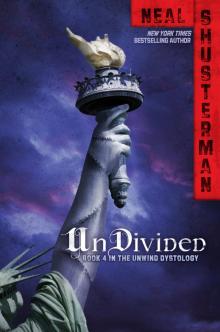 UnDivided
UnDivided UnBound
UnBound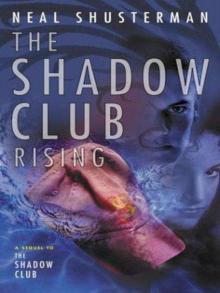 The Shadow Club Rising
The Shadow Club Rising Scorpion Shards
Scorpion Shards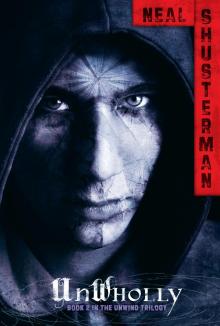 UnWholly
UnWholly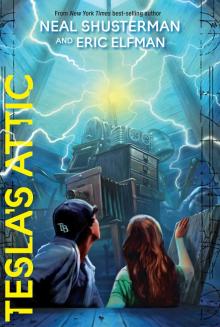 Tesla's Attic
Tesla's Attic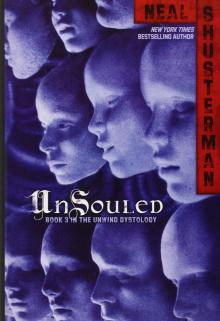 UnSouled
UnSouled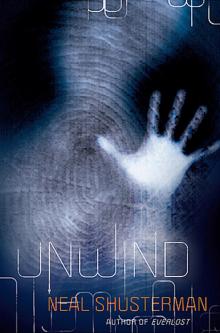 Unwind
Unwind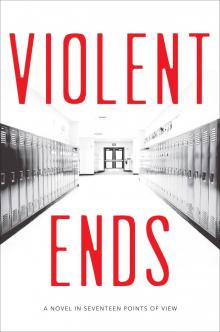 Violent Ends
Violent Ends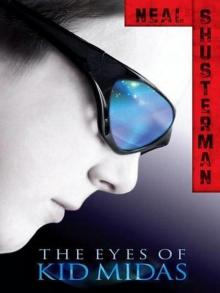 The Eyes of Kid Midas
The Eyes of Kid Midas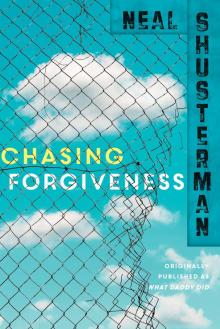 Chasing Forgiveness
Chasing Forgiveness Everfound
Everfound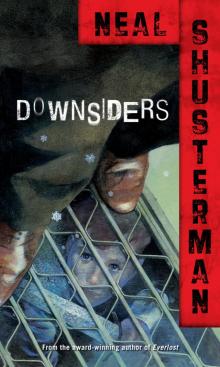 Downsiders
Downsiders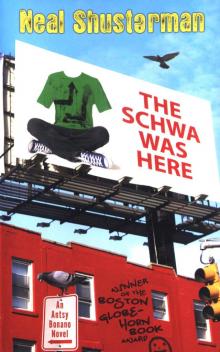 The Schwa Was Here
The Schwa Was Here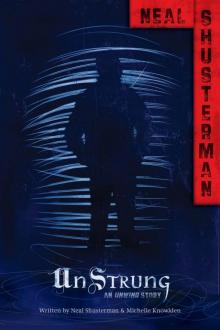 UnStrung
UnStrung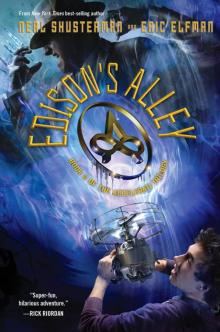 Edison's Alley
Edison's Alley Duckling Ugly
Duckling Ugly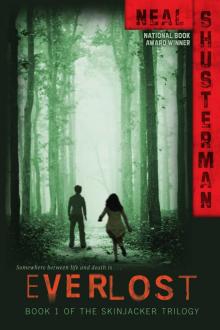 Everlost
Everlost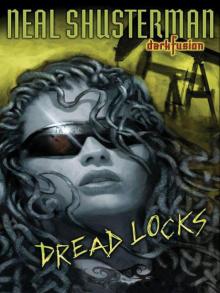 Dread Locks
Dread Locks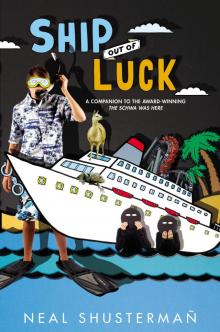 Antsy Floats
Antsy Floats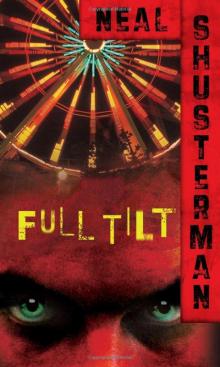 Full Tilt
Full Tilt Thunderhead
Thunderhead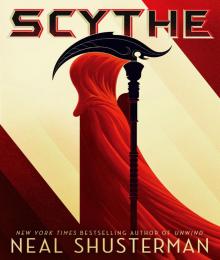 Scythe
Scythe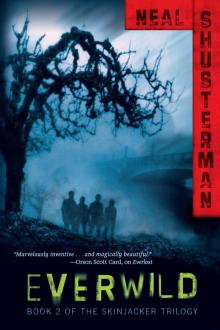 Everwild
Everwild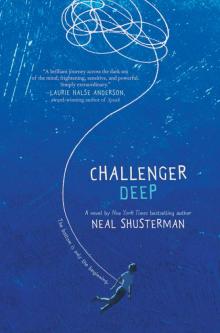 Challenger Deep
Challenger Deep Shattered Sky
Shattered Sky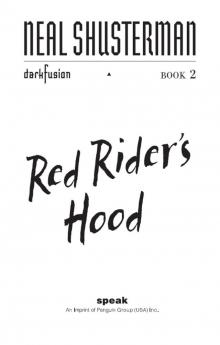 Red Rider's Hood
Red Rider's Hood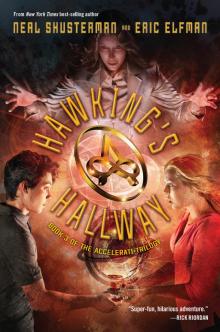 Hawking's Hallway
Hawking's Hallway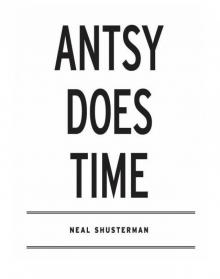 Antsy Does Time
Antsy Does Time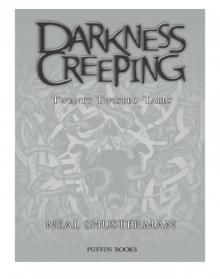 Darkness Creeping: Twenty Twisted Tales
Darkness Creeping: Twenty Twisted Tales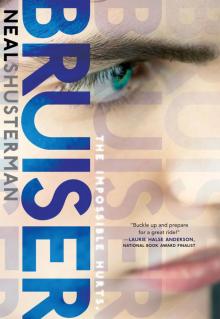 Bruiser
Bruiser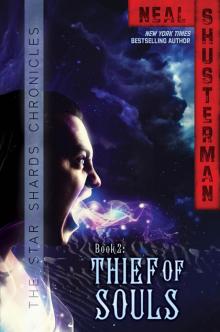 Thief of Souls
Thief of Souls The Toll
The Toll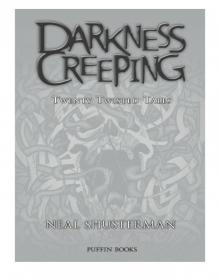 Darkness Creeping
Darkness Creeping Resurrection Bay
Resurrection Bay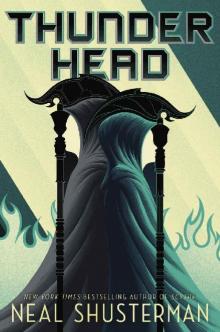 Thunderhead (Arc of a Scythe Book 2)
Thunderhead (Arc of a Scythe Book 2)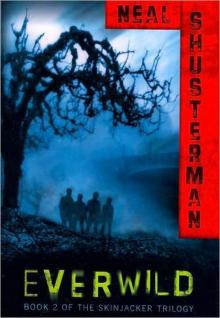 Everwild (The Skinjacker Trilogy)
Everwild (The Skinjacker Trilogy)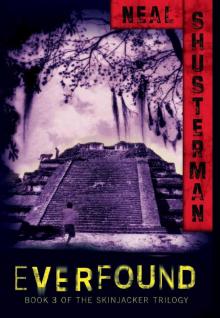 Everfound s-3
Everfound s-3 Edison’s Alley
Edison’s Alley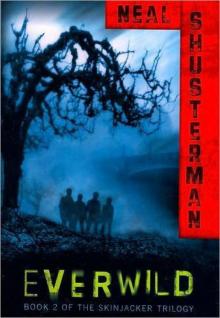 Everwild s-2
Everwild s-2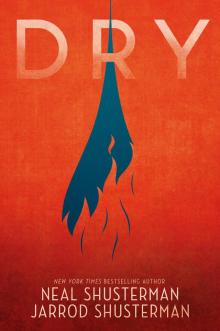 Dry
Dry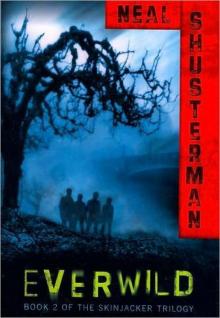 Skinjacker 02 Everwild
Skinjacker 02 Everwild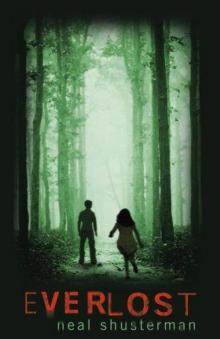 Everlost s-1
Everlost s-1